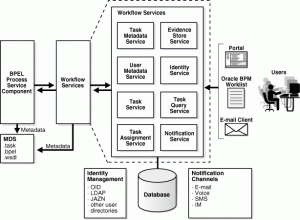Contents
Concepts
Design and Runtime Concepts
Task Assignment and Routing
* Supports declarative assignment and routing of tasks.
* Participant: a user or group of users in the assignment and routing policy definition.
* Participant type:
– Single approver
– Parallel (commonly used for voting)
– Serial (e.g. escalation chain)
– FYI
* Participate assignment:
– Users
– Groups
– Application roles
* Ad hoc routing
* Outcome-based completion of routing flow (complete without finishing rest of steps).
Static, Dynamic, and Rule-Based Task Assignment
* Assign tasks statically.
– A single user, group, or role.
– A comma delimited string of above.
* Assign tasks dynamically.
* Assign tasks with business rules.
Task Stakeholders
* Owner
* Initiator
* Reviewer
* Admin
* Error Assignee
Task Deadlines
* Reminders
* Escalation
* Expiration
* Renewal
Notifications
* Email
* Voice message
* IM
* SMS
Task Forms
* Can be created in JSF, .NET, or any other client technologies using APIs.
* Can be auto-generated using ADF.
Advanced Concepts
* Rule-based routing
* Rule-based participant assignment
* Stages: A stage is a way of organizing the approval process for blocks of participant types.
* Access rules
* Callbacks (extension hooks)
Reports and Audit Trails
* Out-of-box reports for task analysis:
– Unattended tasks
– Tasks priority: Analysis of tasks assigned to a user, reportees, or their groups, based on priority.
– Tasks cycle time: Analysis of the time taken to complete tasks from assignment to completion based on users’ groups or reportees’ groups.
– Tasks productivity: Analysis of assigned tasks and completed tasks in a given time period for a user, reportees, or their groups.
– Tasks time distribution: The time an assignee takes to perform a task.
* Audit trails lists all versions created by the following tasks:
– Initiate task
– Reinitiate task
– Update outcome of task
– Completion of task
– Erring of task
– Expiration of task
– Withdrawal of task
– Alerting of task to the error assignee
Features
Use Cases
* Task assignment to a user or role.
* Use of various participant types.
* Escalation, expiration, and delegation.
* Automatic assignment and delegation. e.g. auto-route to direct report managers.
* Dynamic assignment of users based on task content. e.g. orders larger than 5k needs director approval.
Architecture
* Starting with release 11g, all human task metadata is stored and managed in the Metadata Service (MDS) repository.
Human Workflow Services
* Task service:
– task state and persistence management.
– exposes operations to update a task, complete a task, escalate and reassign tasks, and so on.
– used by Oracle BPM Worklist to retrieve tasks assigned to users.
– determines if notifications are to be sent to users and groups when the state of the task changes.
– Consists of:
~ Task routing service.
~ Task query service.
~ Task metadata service.
* Identity service:
– a thin web service layer on top of the Oracle WebLogic Server 11g security infrastructure or any custom user repository.
– enables authentication and authorization of users and the lookup of user properties, roles, group memberships, and privileges.
* Notification service.
* Metadata service: manages metadata related to workflow users, such as user work queues, preferences, vacations, and delegation rules.
* Runtime config service:
– provides methods for managing metadata used in the task service runtime environment.
– It principally supports management of task payload mapped attribute mappings.
* Evidence service: supports storage and nonrepudiation of digitally-signed workflow tasks.
How to Use Human Task
* Associated with a BPEL process.
* Standalone human task:
– Not associated with a BPEL process.
– Client can create the task themselves.
Human Task Service Engine
* All human task service components, regardless of the SOA composite application of which they are a part, are executed in a single human task service engine.



Hi Jianming,
Do you happen to know how best to set up a group of five participants for parallel group voting and the group of five voters can be mainted by selecting from a larger list ? Do you have any recommendations ?